- Home
- Susan Hill
The Boy Who Taught the Beekeeper to Read: And Other Stories Page 3
The Boy Who Taught the Beekeeper to Read: And Other Stories Read online
Page 3
Outside Nita’s room, they held one another, knowing that the laughter had marked a change.
In the study, hearing their laughter coming faintly from the distant kitchen, their father let misery and loneliness and self-pity wash over him, and sank back, submerging himself under the wave.
What would life be like? They did not know. Each morning they went out of the house together, at the same time, and parted at the end of the next street. Nita walked on, to her hospital reception desk. Kay caught her bus to the department store where she was Ladies’ Fitter.
At six they met again, and walked home. And so, life was the same, it went on in the old way – yet it did not. Even the shape of the trees in the avenue seemed changed. When they neared the house something came over them, some miasma of sorrow and fear and uncertainty, and a sort of dread.
Each knew that the other felt it, but neither spoke of it; they spoke, as before, of the ordinary details of the day, the weather, the news of the town.
And in each of their minds was always the question – will today be different? Will this be the day when he wakes from the terrible paralysis of misery?
But when the door opened into the cool, silent hall and the light caught the bevel of the mirror, they knew at once that after all, this was not the day, and went in to hang their coats and empty this or that bag, to wash and tidy before going in to him.
The medicines had been thrown away and a few bills and receipts and shopping lists, otherwise he would allow nothing to be sorted or moved or cleared.
Everything must remain as she had left it.
Once, a few days after the funeral, Kay had crept into her mother’s bedroom and sat on the bed, which the nurse had stripped and re-made with fresh linen, as if, somehow, her mother might come back and it must be ready for her. And she had been everywhere in the room. Kay had touched the dressing gown behind the door, and the touch had disturbed the faint fine smell of the violet talcum powder and soap her mother had used, and brought her back even more vividly.
Six months later, nothing had been moved, but going into the room again, in search of her mother’s old address book, she had sensed the difference at once. There was a hollow, she was no longer there. The bedroom was quite empty of her.
Kay had found, as she stood for a few moments at the window looking out over the garden, that she could not conjure her mother up in any way, could not picture her, could not remember the sound of her voice. When she touched the dressing gown, the smell had gone.
‘Father ought to go in there now,’ she said, going in to Nita. ‘Surely it might . . .’
Her sister shook her head.
‘Perhaps Dr Boyle –’
‘But he isn’t ill.’
‘I suppose not.’
‘Perhaps you are right though, about the room.’
‘What should we say?’
They imagined what words might conceivably serve, where they might possibly begin.
‘It would be best to be straightforward,’ Nita said at last.
‘Could you?’
‘I – I think I must.’
But two days later, it was Kay who spoke, coming into the drawing room and finding it in darkness, so that she startled him by clicking on the light.
There had been some petty irritations during the day and she was suffering from a cold; if it had not been for those things she might never have confronted him, would never have had the courage.
‘Whatever are you doing sitting here in the dark again, Father? Whatever good is this going to do any of us?’
She saw that she had shocked him and his shock gave her nerve.
‘It is six months since Mother died, half a year. What good are you doing? We have to go out, carry on a life. That’s how it should be, how it has to be. Do you think we haven’t felt it and missed her as much as you? Do you suppose she would think well of you, hiding away, wringing your hands? You’ve interest in nothing, concern for nothing. You’re in the half-dark. Have you wondered how it is for us, coming back to it at the end of every day?’
She heard herself as she might hear someone in a play. She was not startled or made afraid by her own voice, or the passion with which she had spoken. She simply heard herself, with interest but without emotion and when she stopped speaking, she heard the silence.
Her father was staring at her, his face brick-red, his mouth working.
She began to shake.
It was Nita who saved them, coming without any warning into the room.
‘Kay?’
She looked at her sister, at her father, at the two shocked faces and though she had heard nothing of what had been said, the force of it seemed to press down upon the silence that filled the room and Nita understood the enormity of what had happened.
‘Kay?’
But Kay was frozen, she could neither speak nor move, could scarcely even breathe.
And then he got up and without looking at either of them, blundered out of the room, and through the hall towards the stairs.
When they returned home the following evening he was not in the house. He had left before ten, Mrs Willis said, in a taxi which was taking him in to the city.
By the time he returned they had gone to bed, though both were lying awake, turning the events over in their minds. Both heard his key in the lock, his footsteps, the closing of his bedroom door. Both thought of creeping along the corridor to the other. Neither did.
The next day, the pattern was the same, and so, until the end of that week, on the Saturday, he ate lunch and supper with them. But something in his look forbade them to refer to any of it. Kay was terrified of catching his eye.
‘He is my father, why should I be afraid of him?’
The news was on the television, the one programme they always watched, as they had watched it every night with their mother. Somehow, speaking over the voices on it seemed to Kay like not quite speaking at all.
The news ended. Nita got up.
‘He should be grateful to us,’ she said and her voice rose. ‘Grateful!’
Her sister’s face had flushed and Kay saw that there were tears in her eyes.
‘It had to stop and I didn’t have the courage to say it.’
She went quickly out of the room. Kay stared at the blank screen, and quite suddenly, her mother’s face came to mind; she saw her as she had been, long before the illness, saw her grey, neatly parted hair and the soft cheeks, saw her smiling, pleased, patient expression. She had gone and now she had come back.
The television screen remained opaque and grey.
‘Yes,’ Kay said to herself. ‘Yes.’
As she left the sewing room where they kept the television set her father came out of his study and instinctively Kay stepped back, acutely conscious of what had been said earlier.
‘Kay.’
She found herself reaching out, and then held by him, her face against his sleeve, pressed into the cloth, smelling his soap and the faint smell of his city day which brought her childhood back to envelop her and hold her as he held her himself.
Nothing else was said after the one word ‘Kay’ and in a second or two he disengaged himself gently and went down the passage towards the side door that led to the garden. Every night, until the last weeks of her mother’s life, he had gone there at the end of the evening to smoke a single small cigar. Kay went up to her bedroom and opened the window and after a moment the smell of the smoke came to her from the garden below.
She felt a rush of the most exhilarating happiness, as the anxiety and gloom of the past weeks fell away. The house had been sunk into the dreary aftermath of their mother’s death for so long that she had forgotten even the small, pleasant details of everyday life until now, when one of them had been given back. They were all weary, their flesh felt dead, their skins grey, their movements were slow; there had been no lightness in anything, the subdued atmosphere had become usual, their father’s isolated uncommunicated grief suffocating everything that might have been e
njoyed or anticipated.
She leaned further out of the window, intent on catching as much as possible of the smell of his cigar smoke.
We have come through it, she thought. We have come through.
She was not rash enough to expect life to be everything that it had been. Their mother was dead. Nothing could alter that, nothing lessened the pain though the death had been ‘a blessing’.
But something had changed at last. They had all moved on and surely for good.
She waited at the open window until the last trace of smoke had faded from the air and the only smell was of night, and grass and the earth. Then she got into bed, and slept like something new born.
And indeed, slowly, gradually the mood in the house lightened. Their father spoke to them, went out, returned with the evening paper, opened letters, worked at his desk. There was no laughter yet, and no social life. Friends and neighbours were not invited. But they had all of them lost the habit of that and did not feel any particular need yet to re-acquire it.
‘In the summer,’ Nita said.
‘Perhaps we could have one of the old summer garden parties.’
‘I wonder – do you think Father has given any thought to a holiday?’
Such small exchanges lightened their days. There was no sense of urgency or anxiety, no need to push forward too fast. But when they spoke of their mother now it was with smiling reminiscence, only tinged at the edges with sorrow.
On a Wednesday evening, almost eight months after the death, they walked down the avenue together as usual, and into the house.
‘Hello?’
Sometimes they returned first, sometimes he did, and so one or other always called out.
‘Hello?’
It was late spring but exceptionally warm. The drawing-room door was open. Nita went through.
The French windows were also open. From the garden came voices speaking quietly together.
‘Kay.’
‘What’s wrong?’
‘There is – there’s someone in the garden with Father.’
They looked at one another, recognising the next step taken, the next stage reached.
‘Good,’ Kay said. ‘Isn’t that good?’
Though they had to wait and absorb it, take in the feeling of strangeness. No one else had been in the house since the day of the funeral. Now someone was here, some old friend of his, some neighbour, and although if asked they would each have said that they welcomed it, nevertheless it felt like a violation of something that had grown to become sacred.
The clock ticked in the hall behind them.
‘Oh goodness,’ Kay said, half-laughing with impatience at their own hesitation, and walked boldly out through the open windows onto the terrace.
The scene, and the next moments that passed, took their place in the series of ineradicable pictures etched into their minds, joining their mother’s deathbed, the funeral, the sight of their father leaning over the grave.
Two garden chairs were drawn up on either side of the small table. Two cups and saucers, the teapot, milk jug and sugar bowl stood on the table. That fact alone they had difficulty in absorbing, and wondered wildly how the tea had come to be made and found its way out there.
Hearing them, their father turned, but did not get up.
Kay and Nita hesitated like children uncertain of what to say or do next, needing permission to come forward. They were on the outside of a charmed circle.
‘Here you are!’ he said.
After another moment, and as one, they began to cross the grass.
‘This is a friend of mine – Leila. Leila Crocker.’ He gestured expansively. ‘My daughters. Nita. Kay.’
They knew, Nita said afterwards. They knew absolutely and at once and their stomachs plunged like lifts down a deep shaft, leaving only nausea.
The garden froze, the colours were blanched out of everything, the leaves stiffened, the trees went dead. Unbelievably, instinctively, impossibly, they knew.
She stood. Said, ‘How very nice.’
Under their feet, deep below the grass and turf, the earth seemed to shift and heave treacherously, shaking their confidence, throwing them off balance. The sky tipped and ended up on its side, like a house after a bomb had fallen.
At the moment of death, it is said, a person’s past rushes towards them, but it was the whole of the future that they saw, in the instant between taking in the presence of the woman with their father, and her words; and in composing themselves to greet her, they saw what was to come in every aspect and detail, it seemed.
‘But that cannot have been so,’ Nita said, years later. Yet it had. They knew that absolutely.
But all they saw was a woman, of perhaps forty-five, perhaps a few years less or a few years more, who wore a cherry-red suit and had hair formed in an extraordinary bolster above her brow, and who was called Leila Crocker.
‘Leila,’ she said quickly; ‘please call me that.’
They would not. At once they retreated into themselves like snails touched on the tenderest tips of their horns. They could not possibly call her Leila, and so they called her nothing at all.
‘I’m afraid the tea will have gone cold.’ And she touched the china pot with the blue ribbon pattern. Nita and Kay flinched, though giving no outward sign. The last woman to have touched the blue ribbon teapot had been their mother.
‘Not that we’ve left much of it I’m afraid.’
Their father’s voice sounded quite different to them. Lighter, younger, the tone oddly jovial. Everything about him was lighter and younger. He sat back smiling, leaning back in the garden chair, looking at the blue ribbon teapot, and at the woman.
‘No please.’ Nita made a strange little gesture, like a half-bow. ‘Don’t worry. We always make tea freshly.’
No one moved then. No one else spoke.
We make a tableau, Kay thought, or one of those old pictures. ‘Tea in the Garden’ – no, ‘A Visitor to Tea’.
Their father might have spoken then, might have told them to take their freshly made tea into the garden to join them. The woman might have said, observing their evening routine, that she must go. But he did not, she did not; they sat, as if waiting to resume an interrupted conversation, so that in the end it was Nita who broke the tableau, by turning and going quickly back across the lawn and through the open French window into the house. Kay gave a half-smile, as if in some kind of hopeless explanation or apology – though meaning neither – before following her sister. Just at the window, she glanced quickly back, expecting them to be watching, feeling their eyes on her. But her father and the woman were turned towards one another, both leaning forwards slightly, their eager conversation eagerly resumed.
We might not have been here, Kay thought.
In the kitchen, Nita dropped the lid of the kettle and the sound went on reverberating on the tiled floor, even after she had bent impatiently to pick it up.
Rain poured off the roofs of the houses they walked past and the early blossom lay in sad, sodden little heaps in the gutter. Spring had retreated behind banked, swollen clouds and a cold wind.
‘Perhaps it is time for us to leave home,’ Kay said into the umbrella with which she was trying to shield her head and face. Nita stopped dead and lifted her own umbrella to stare at her sister and the rain flowed off it down her neck.
‘Even without . . . well, there will surely be changes. Perhaps we should institute our own.’
‘Why must there be changes?’
‘Aren’t we rather too old to be living at home still?’
Kay was thirty-five, Nita about thirty-seven. They looked older. Felt older.
‘But wherever would we go to? Where would you want to go?’
‘A flat?’
‘Do you like flats?’
‘Not particularly.’
‘We are perfectly happy and comfortable as we are.’
‘Yes.’
They turned the corner. Each had had a private inner glimpse into
the rooms of a small flat, and looked quickly away.
‘Besides.’
The rest was unspoken, and perfectly understood. Besides, Nita would have continued, now that she has come to the house there is all the more reason than ever for us to stay.
Every afternoon since that first day when they had stepped into the garden and seen their father sitting with Leila Crocker over the blue ribbon teapot, they had dreaded coming home and finding her there again. Twice already they had done so. Once, the two of them had been seated in exactly the same place in the garden, the table and the tea things between them so that they might never have moved at all.
The next time, Leila Crocker had been coming along the passage from the downstairs cloakroom as they opened the front door. None of them had known what to say.
Now, Kay turned her key in the lock, pushed the door slowly and waited. They both waited, listening. But the house was empty, they could feel at once. It felt and sounded and smelled empty. The clock ticked. Nita took both umbrellas out to the scullery.
At the end of the television news, when Kay had switched off the set, their father had not come home.
‘He has never said anything.’
‘Perhaps he has nothing to say.’
‘He has told us nothing about her. Wouldn’t it be usual – to tell something?’
‘What is “usual”? I don’t think I know.’
‘No.’
It was not that he had behaved secretively, or evasively, or avoided them. Things had gone on exactly as before. Except that in some vital, deep-rooted way, they had not. Because always, no matter how he behaved, the woman was between the three of them.
The taxi came for him each morning. He went out, returned, sometimes very late, opened his letters, read the newspaper, worked at his desk, smoked his single late cigar. When they were all together, he ate with them. When he was not at home, they had no idea of where he was and could not ask.
The house seemed suddenly imbued with meaning, redolent of their past and precious to them. Every door handle and window-pane and cupboard. Every book and curtain and step on the stairs. The mirror in the hall and the clock and the blue ribbon teapot, all seemed to hold the life of their family within every atom, to be infinitely more than household objects made of wood and glass and metal and china and paint. Every touch and footstep, the echo of every word spoken, was part of the fabric and substance of the house. At night they lay and wrapped it round themselves and held it to them.

 Mrs De Winter
Mrs De Winter A Question of Identity
A Question of Identity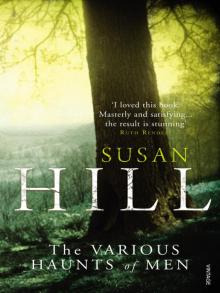 The Various Haunts of Men
The Various Haunts of Men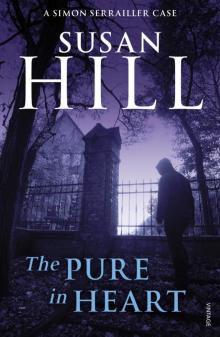 The Pure in Heart
The Pure in Heart Printer's Devil Court
Printer's Devil Court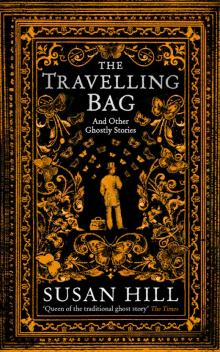 The Travelling Bag
The Travelling Bag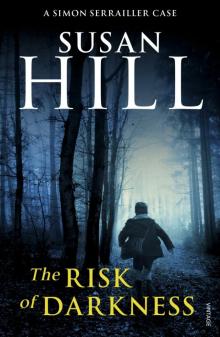 The Risk of Darkness
The Risk of Darkness A Kind Man
A Kind Man Black Sheep
Black Sheep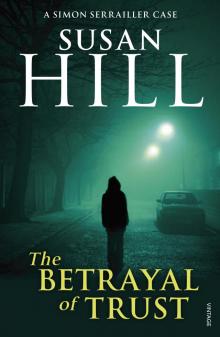 The Betrayal of Trust
The Betrayal of Trust The Service of Clouds
The Service of Clouds Betrayal of Trust
Betrayal of Trust The Small Hand
The Small Hand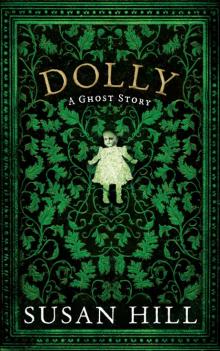 Dolly
Dolly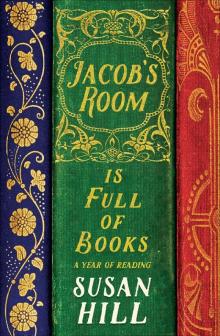 Jacob's Room Is Full of Books: A Year of Reading
Jacob's Room Is Full of Books: A Year of Reading The Vows of Silence
The Vows of Silence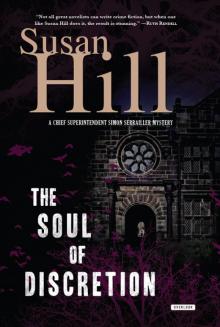 The Soul of Discretion
The Soul of Discretion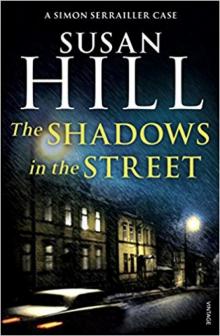 The Shadows in the Street
The Shadows in the Street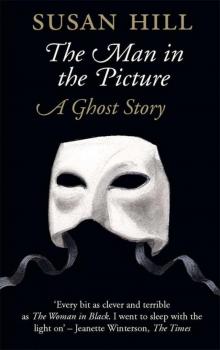 The Man in the Picture
The Man in the Picture Air and Angels
Air and Angels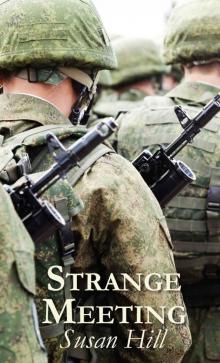 Strange Meeting
Strange Meeting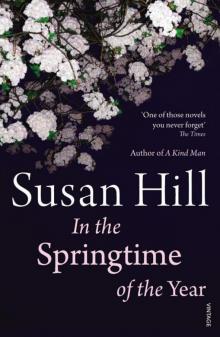 In the Springtime of the Year
In the Springtime of the Year Howards End Is on the Landing: A Year of Reading From Home
Howards End Is on the Landing: A Year of Reading From Home From the Heart
From the Heart Old Haunts
Old Haunts The Mist in the Mirror
The Mist in the Mirror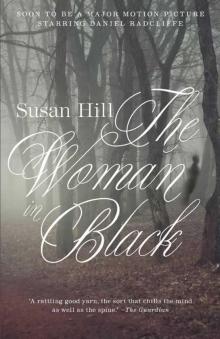 The Woman in Black: A Ghost Story
The Woman in Black: A Ghost Story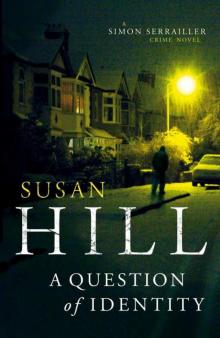 A Question of Identity (Simon Serrailler 7)
A Question of Identity (Simon Serrailler 7)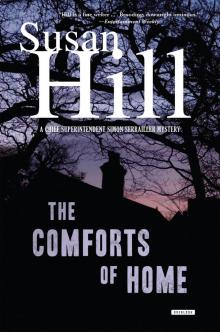 The Comforts of Home
The Comforts of Home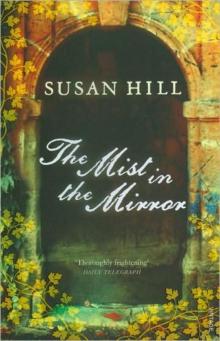 Mist in the Mirror
Mist in the Mirror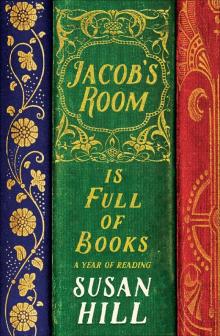 Jacob's Room is Full of Books
Jacob's Room is Full of Books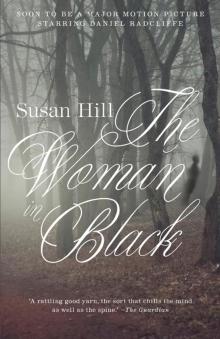 The Woman in Black
The Woman in Black Howards End is on the Landing
Howards End is on the Landing